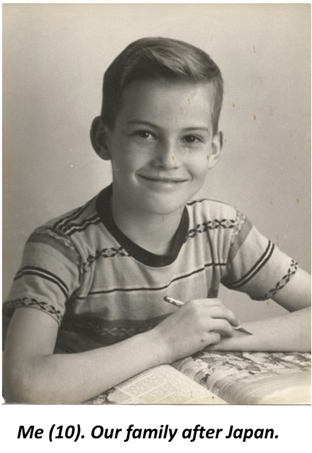 |
I
grew up on a 128-acre dairy farm at the foot
of the Blue Mountains in Lebanon County, Pennsylvania.
My parents affiliated with a very conservative
Mennonite community. The rhythm of the farm
(milkings, planting and harvesting) and the
discipline of the Mennonites (revival meetings,
plain clothes and conscientious objection to
war) fenced our life. But daily life was rich—our
farm was overrun with cows and rabbits and chickens.
We spent holidays with wonderful cousins and
aunts and grandparents.
I
hated farm work and resolved early on it wasn’t
for me. I spent a great deal of my boyhood escaping
into novels when I was supposed to be cultivating
the corn. Early on I felt a thirst for the Larger
World. My stamp collection drove that—Sverige?
Manchukuo? What were these countries like? Our
house was an 18th century log house, plastered
over, but in the cellar the gunslits in the
walls hinted of stories from the Settler/Indian
conflicts of pre-Revolution America. I scribbled
out my first stories when I was ten and took
them to family reunions, where I read them aloud
to my cousins. They asked for more!
I
discovered my knack for foreign languages in
high school—Latin was fun. I studied Spanish
and German simultaneously at Lancaster Mennonite
School. But I found I couldn’t speak these
languages, even after four years of German.
In contrast, in Japan, where I landed after
college (Eastern Mennonite), I lived with the
Yamaguchi Family and became fluent in Japanese.
However, Japan was a parenthesis, I thought,
irrelevant to my determination to become a famous
writer, like the literary giants we’d
studies in college: Dostoevsky, William Faulkner
. . . .I returned to the U.S. in time to participate
in the Mennonite Renaissance of the Seventies.
Mennonites were overthrowing the rule of the
conservative bishops and indulging in the arts.
I saw my first movie at 22. Merle Good’s
Dutch Family Festival ran plays on Mennonite
themes. Tens of thousands of tourists were descending
on Lancaster County every summer and paying
good money ‘to see the Amish’ –I
could hardly believe it! I wrote several plays
that DFF produced for the tourists, then a series
of stories on my Mennonite childhood and finally
Mennonite Soldier, the fictional story of my
grandfather’s life, set in World War I.
I called it Amish Soldier, until the Amish leaders
threatened the Mennonite Press with a boycott
of their products. The forced change made the
book controversial and I sold 10,000 copies.
|